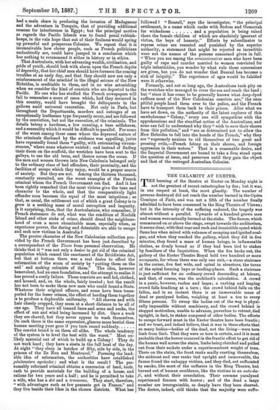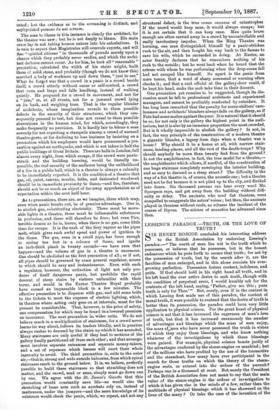THE CALAMITY AT EXETER.
THE burning of the theatre at Exeter on Monday night is not the greatest of recent catastrophes by fire; but it was, in one respect at least, the most ghastly. The number of persons destroyed did not reach the number burned in the Opera Comique of Paris, and was not a fifth of the number finally admitted to have been consumed in the Ring Theatre of Vienna; but in the intensity of the suffering endured, the tragedy was almost without a parallel. Upwards of a hundred grown men and women were actually burned at the stake. The flames, which commenced on or above the stage, swept towards the auditorium, it seems clear, with that roar and rash and irresistible speed which flame has when mixed with volumes of escaping and ignited coal- and when they reached the gallery, which they did in five minutes, they found a mass of human beings, in inflammable clothes, as firmly bound as if they had been tied to stakes by familiars of the Inquisition. When the fire broke out, the gallery of the Exeter Theatre Royal held two hundred or more occupants, for whom there was only one exit,— a stone staircase in the corner, five feet wide, and spiral in structure, the turns of the spiral forming bays or landing-places. Such a staircase is just sufficient for an ordinary crowd descending at leisure, and that, of course, was the architect's calculation. A crowd in a panic, however, rushes and leaps; a rushing and leaping crowd falls headlong at a. turn ; the crowd behind falls on the fallen, and in an instant there is an immoveable mass of dead or paralysed bodies, weighing at least a ton to every fifteen persons. To sweep the bodies out of the way is physi- cally impossible without machinery, and the crowd behind is stopped motionless, unable to advance, powerless to retreat, tied upright, in fact, to stakes composed of other bodies. The efforts to escape forward must in the Exeter theatre have been frantic; and we trust, and indeed believe, that it was in these efforts that so many bodies—bodies of the dead, not the living—were torn limb from limb. That they were so torn is certain, and it is most probable that the horror occurred in the frantic effort to get rid of the human well across the stairs, limbs being clutched and pulled out from their sockets under a superincumbent weight of tons. There on the stairs, the front ranks madly exerting themselves, the midmost and rear ranks tied upright and immoveable, the flames found the unhappy victims, and they died, not suffocated by smoke, like most of the sufferers in the Ring Theatre, but burned out of human semblance, like the victims in an atito-da- fi, and without their consolation. Their screams paralysed experienced firemen with horror; and of the dead a large number are irrecognisable, so deeply have they been charred. The doctor, indeed, still thinks that the majority were Buffo-
cated ; bat the evidence as to the screaming is distinct, and asphyxiated persons do not scream.
The man to blame in this instance is clearly the architect, for the theatre was new ; bat be is not deeply to blame. His main error lay in not taking human nature into his calculations. It is vain to expect that Magistrates will overrule experts, and will fare " spirited citizens " in thousands of pounds merely upon a chance which they probably never realise, and which the archi- tect declares cannot occur. AB for him, he took all" reasonable " precaution, calculated the width of his stairs aright, built them of solid stone, and probably (though we do not know this) marched a body of workmen up and down them, " just to see." What he forgot was that a crowd in a panic is a crowd beside itself, a crowd utterly without sense or self-control, a crowd that runs and leaps and falls headlong, instead of walking quietly. He prepared for a crowd in movement, and not for a "jam," or, at all events, not for a jammed crowd lying on its back, and weighing tons. That is the regular blunder of architects, whose imagination reveals to them possible defects in the security of their structures, which they con- sequently proceed to test, but does not reveal to them possible aberrations in the human mind, for which, accordingly, they make frequently no provision. It is hardly fair to blame a man severely for not expecting a stampede among a crowd of amused theatre-goers, or for declining to lose business by insisting on a precaution which hie employers would have pronounced a pre- caution against an earthquake, and which is not taken in half the public buildings of Great Britain. There are halls in London, frill almost every night, from which escape, if the crowd were panic- struck and the building burning, would be literally im- possible, the real security of the audience being the unlikelihood of a fire in a public hall, which in a theatre is always a calamity to be immediately expected. It is the condition of a theatre that gas, oil, paint, canvas, muslin, lathe, and desiccated woodwork should be in immediate proximity to flame,—and fire, therefore, should not be so much an object of far-away apprehension as of expectation within the next halthour.
As to precautions, there are, as we imagine, three which may, oven when panic breaks oat, be of genuine advantage. One is, to abolish gas, substituting electricity. There must be move- able lights in a theatre, there must be inflammable substances in profusion, and there will therefore be fires; but even Fire, terrible demon as he is, leaves, when there is no gas, some little time for escape. It ie the rush of the fiery vapour as the pipes melt, which gives such awful speed and power of ignition to the flame. The gas, even in a small pipe, has force enough to spring ten feet in a column of flame, and ignite an inch-thick plank in twenty seconds—we have seen that happen—and the volume of gas in a theatre ie enormous. Gas should be abolished as the first precaution of all ; or if not, all pipes should be governed by some general regulator, access to which should be easy and instantaneous. Even with such a regulator, however, the extinction of light not only pro- duces of itself dangerous panic, but prohibits the rapid descent of steep stairs by visitors unfamiliar with their turns, and would in the Exeter Theatre Royal probably have caused an impassable block in a few minutes. The effective precaution is to dispense with gas, and add some trifle to the tickets to meet the expense of electric lighting, which, in theatres where acting only goes on at intervals, must for the present be considerable. That, however, is the price of safety, one compensation for which may be found in a lowered premium on insurance. The next precaution is, wider exits. We do not believe much in a multiplication of staircases, for a crowd never learns its way about, follows its leaders blindly, and in practice always rushes to descend by the stairs up which it has ascended. Many staircases are only useful if they lead to sections of the gallery finally partitioned off from each other; and that arrange- ment involves separate entrances and separate money-takers, and a set of expenses which lessees will exert their whole ingenuity to avoid. The third precaution is, exits to the outer air,—that is, strong and wide outside balconies, from which spiral staircases reach to the ground below. It is, we believe, perfectly possible to build these staircases so that stumbling does not matter, and the crowd, mad or sane, simply most go down one by one. We agree with the St. Tantee's Gazette that this precaution would constantly save life—as would also the stretching of loose nets such as acrobats rely on, instead of mattresses, under the jumpers—and the mere knowledge of its existence would check the panic, which, we repeat, and not any structural defect, is the true causes caimans of catastrophes If the crowd would keep sane, it would always escape; bat it is not certain that it can keep sane. Men quite brave enough are often carried away in a crowd by uncontrollable and really involuntary impulse. When the Ring Theatre was burning, one man distinguished himself by a panic-stricken rush to the air, and then fought his way back to the flames to save his wife, which he succeeded in doing. At Exeter, an actor frankly declares that he remembers nothing of his rash to the outside ; but he went back when he heard that the actress with whom he was performing when the drop-scene fell had not escaped like himself. So apart is the panic from mere terror, that a word of sharp command or warning often checks it ; and that a cool official at the gallery-door could, if he kept his head, make the mob take time in their descent.
One precaution yet remains to be suggested, though its dis- cussion must be left to professional architects and experienced managers, and cannot be profitably conducted by outsiders. It has long been remarked that the penalty for scene-shifters' care- lessness and architects' blunders always falls on the gallery, as if Fate had some malice against the poor. It is natural that it should be so, for not only is the gallery the highest point in the audi- torium, but it is also by an immense proportion the most crowded. But is it wholly impossible to abolish the gallery ? Is not, in fact, the very principle of the construction of a modern theatre a gigantic blunder, a legacy from days when a theatre was a house ? Why should it be a house at all, with narrow stair- cases, landing-places, and all the rest of the death-traps p Why should anybody be more than twenty feet from the ground ? Is not the amphitheatre, in fact, the true model for a theatre,—. the amphitheatre which allows, if needful, of the construction of one huge staircase completely enveloping the interior building, and as easy to descend as a steep street ? The difficulty in the way of a flat theatre is, of course, the acoustic one ; but a theatre need not be flat because it is not piled up to the sky, and divided into floors. Six thousand persons can hear every word Mr. Spurgeon says, and get away from the building without diffi- culty or delay. The ancients, who used flat theatres, were compelled to exaggerate the actors' voices ; but then, the ancients played in theatres without roofs, as witness the incident of the cranes of lbycus. The science of acoustics has advanced since then.



































 Previous page
Previous page